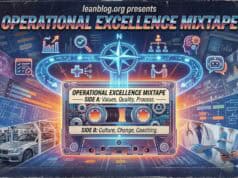Here are links to some more articles I've read recently that might be of interest related to Lean, systems, and improvement. The “good news” stories are the last two, of course…
AIM: False STEMI activations lead to costs, inappropriate cath lab use – by comparison, ThedaCare, is fast AND accurate in its Code STEMI diagnosis
Failure In Central Line Infection Prevention, Survey Says – Dr. Peter Pronovost blames arrogance and ignorance amongst leaders and physicians
Why Can't Obama Bring Wall Street to Justice? – follow the money?
On the Record with Dr. John Toussaint, CEO, ThedaCare Center for Healthcare Value – Interview with Dr. Toussaint
Hospital robot blasts bacteria with UV rays – might be effective, but cheaper countermeasures are out there?
If you’re working to build a culture where people feel safe to speak up, solve problems, and improve every day, I’d be glad to help. Let’s talk about how to strengthen Psychological Safety and Continuous Improvement in your organization.









In the article, “Failure In Central Line Infection Prevention, Survey Says” these three sentences nail the differences in company cultures and consumer expectations/requirements.
“Many of you probably saw the CEO of Toyota publicly apologize (because) four people died a year for five years needlessly, for a total of 20. Those deaths were tragic and he should apologize.”
“But we know that in the U.S. alone, 30,000 to 31,000 people die a year from central line-associated bloodstream infections every year, and we have the technology that virtually eliminates that.
Imagine if every Chief Medical Officer had to report in a congressional hearing for every 4 deaths a year that occurred like Toyota had to. One of these things is not like the other…
Great questions, Isaac. I’m not sure why there isn’t more interest or outrage from the public, media, Congress, etc. When submitting op-ed pieces recently, a number of newspaper editors have said there is no interest, the public “yawns” at the topic, said one.
Hospitals aren’t doing their jobs and, arguably, neither is the media. The U.K. media has focused much more on MRSA and other hospital-acquired infections. Even if there is some sensationalism in the coverage, the problem is real.
[…] the format used by Mark Graban at LeanBlog.org, here are some of the things I’ve been reading lately that are relevant to […]